Abstract
This study describes the production and characterization of mouse monoclonal antibodies (Mab) to LolpI (Rye I), the major allergen of rye-grass pollen. Hybridoma cell lines were screened for the secretion of Mab, the binding of which to labelled LolpI could be inhibited by pooled human sera containing IgE and IgG anti-LolpI antibodies. Twenty monoclonal hybridoma cell lines were expanded, and their product was purified and characterized. Each Mab bound to LolpI but not to unrelated antigens. Cross-inhibition studies allowed the grouping of these 20 Mab into five families differing by their epitope specificity. One representative Mab of each family was tested for its ability to inhibit human IgE/IgG anti-Lolp-I from 15 allergic donors as well as for its inhibition by affinity-purified anti-LolpI antibodies isolated from 14 donors. The results indicated that each family of Mab was specific for an epitope that was identical or close to that recognized by some human anti-LolpI antibodies. It is further shown that human IgE/IgG anti-LolpI are heterogeneous with some patients reacting preferentially with one or two epitopes defined by the Mab LolpI, and others reacting with epitopes different from those identified by the Mab LolpI.
Full text
PDF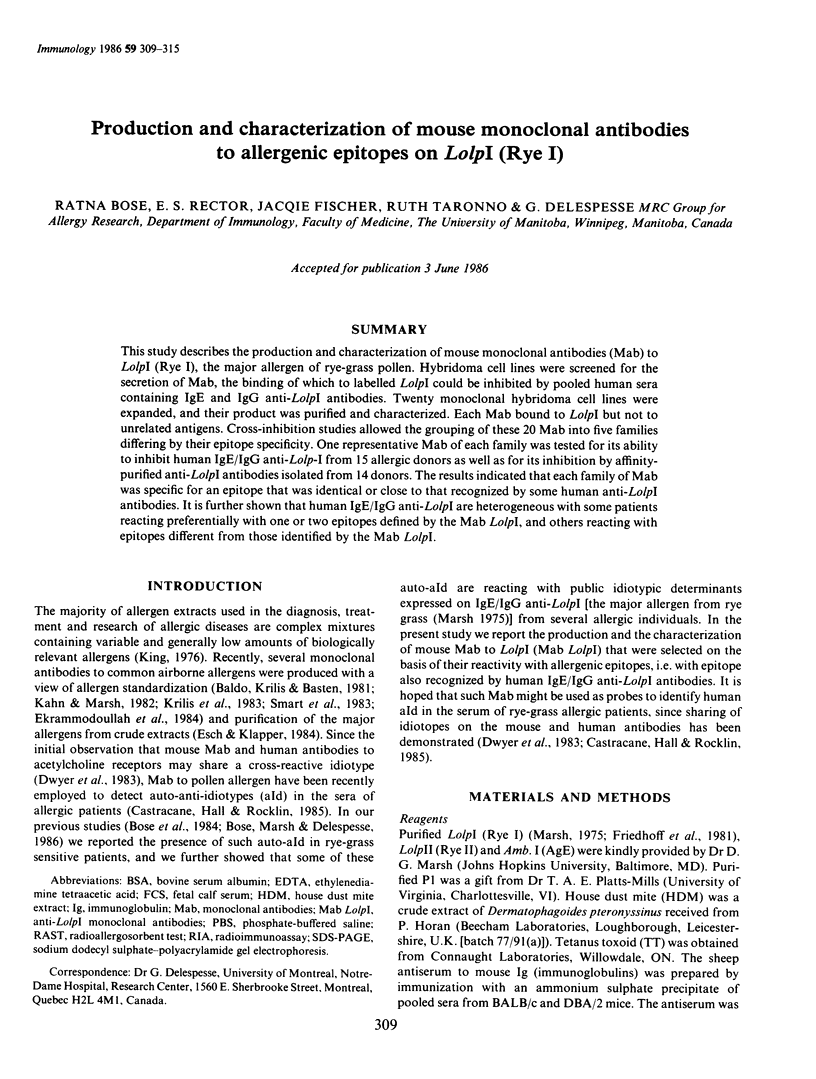
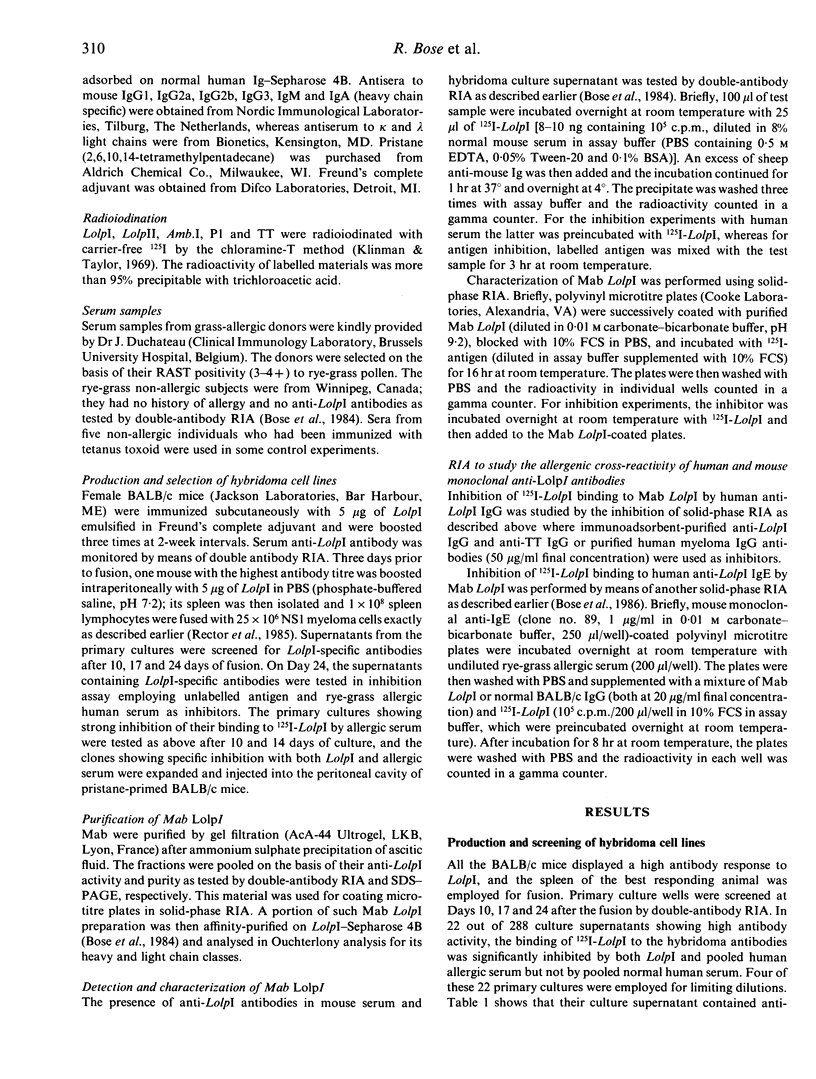
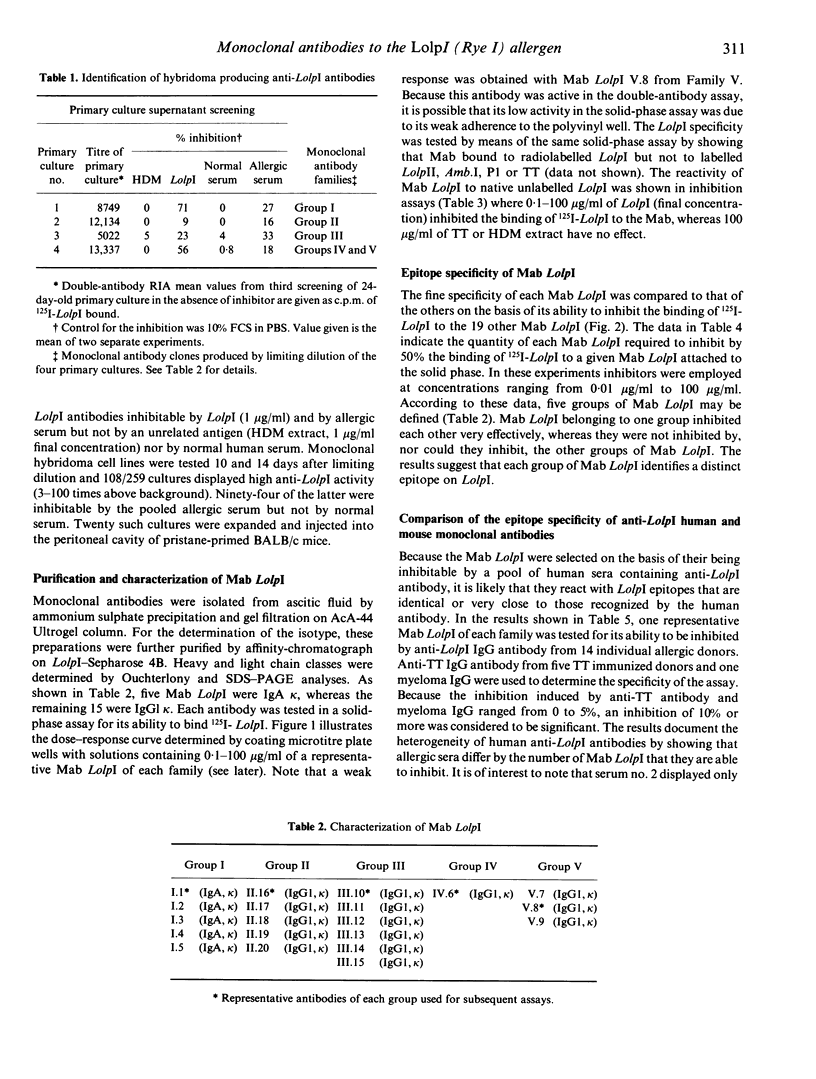
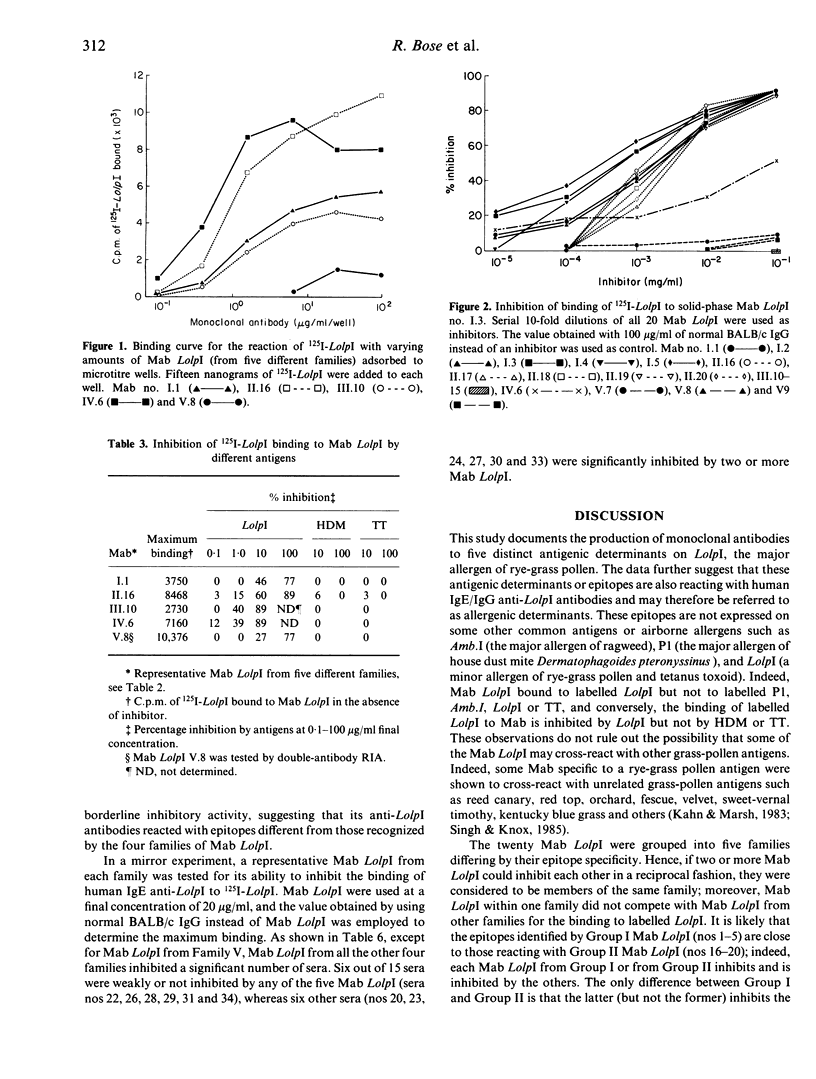
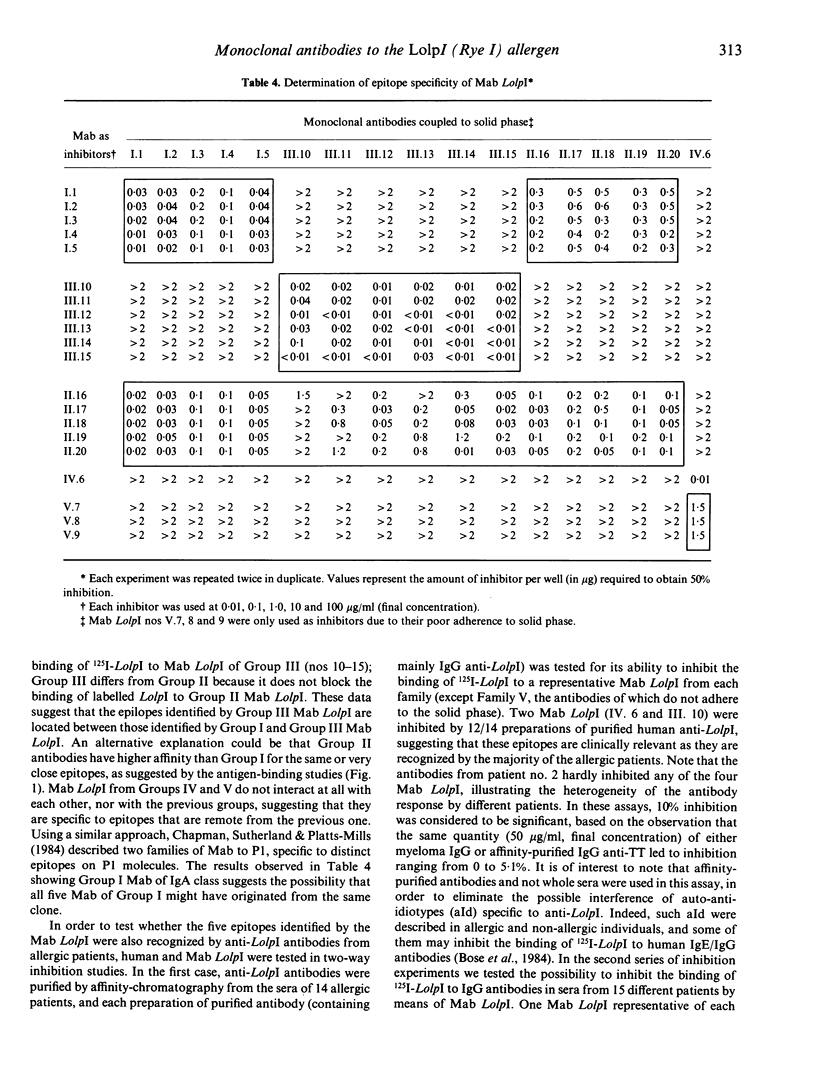
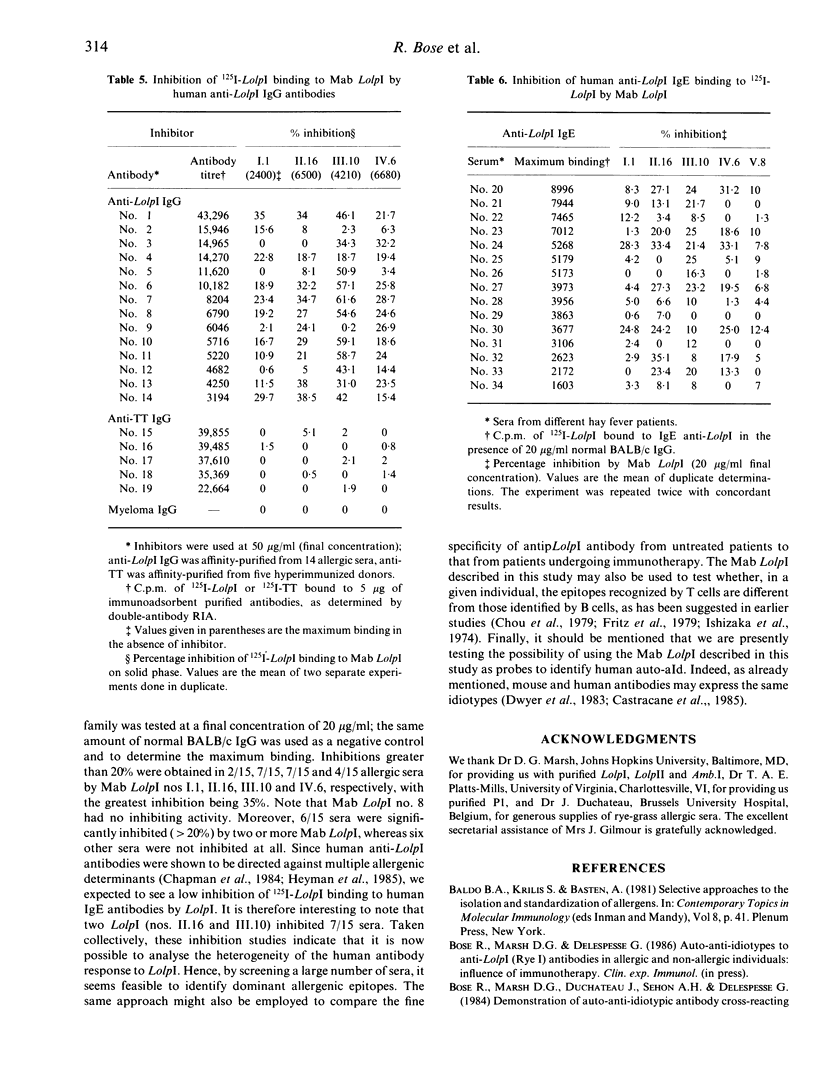
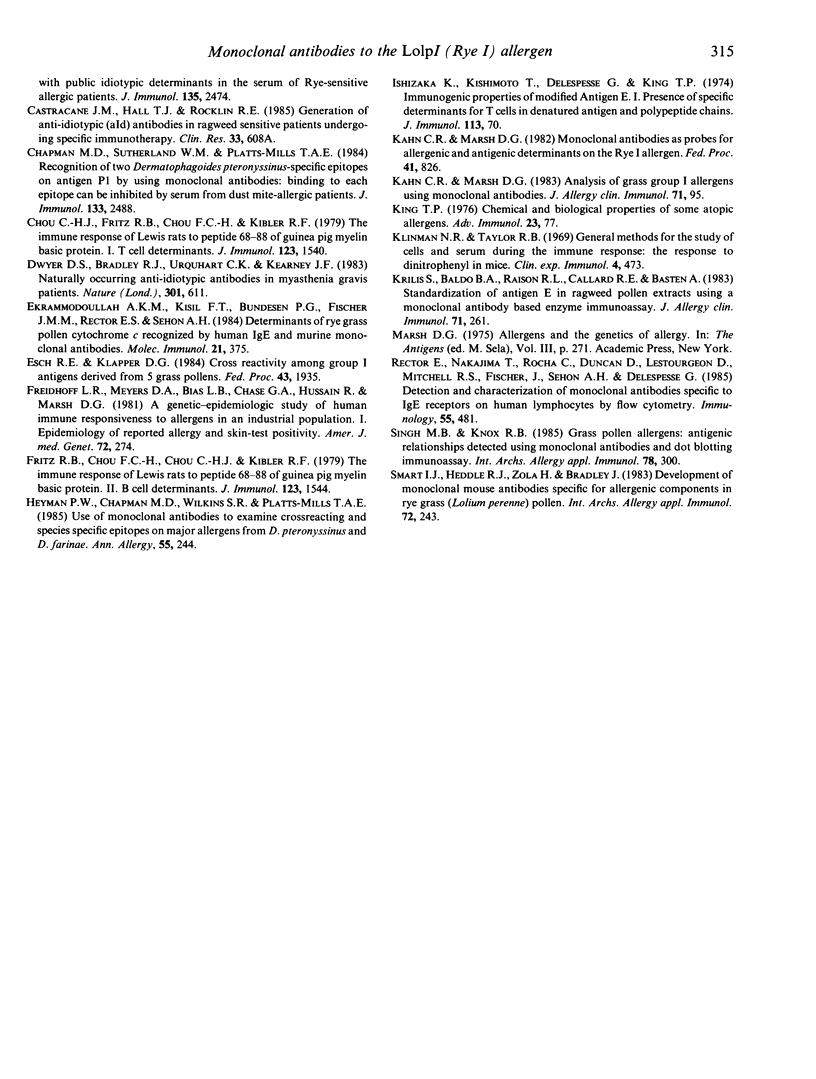
Selected References
These references are in PubMed. This may not be the complete list of references from this article.
- Bose R., Marsh D. G., Duchateau J., Sehon A. H., Delespesse G. Demonstration of auto-anti-idiotypic antibody cross-reacting with public idiotypic determinants in the serum of rye-sensitive allergic patients. J Immunol. 1984 Nov;133(5):2474–2478. [PubMed] [Google Scholar]
- Chapman M. D., Sutherland W. M., Platts-Mills T. A. Recognition of two Dermatophagoides pteronyssinus-specific epitopes on antigen P1 by using monoclonal antibodies: binding to each epitope can be inhibited by serum from dust mite-allergic patients. J Immunol. 1984 Nov;133(5):2488–2495. [PubMed] [Google Scholar]
- Chou C. H., Fritz R. B., Chou F. C., Kibler R. F. The immune response of Lewis rats to peptide 68-88 of guinea pig myelin basic protein. I. T cell determinants. J Immunol. 1979 Oct;123(4):1540–1543. [PubMed] [Google Scholar]
- Dwyer D. S., Bradley R. J., Urquhart C. K., Kearney J. F. Naturally occurring anti-idiotypic antibodies in myasthenia gravis patients. Nature. 1983 Feb 17;301(5901):611–614. doi: 10.1038/301611a0. [DOI] [PubMed] [Google Scholar]
- Ekramoddoullah A. K., Kisil F. T., Bundesen P. G., Fischer J. M., Rector E. S., Sehon A. H. Determinants of ryegrass pollen cytochrome c recognized by human IgE and murine monoclonal antibodies. Mol Immunol. 1984 May;21(5):375–382. doi: 10.1016/0161-5890(84)90034-8. [DOI] [PubMed] [Google Scholar]
- Fritz R. B., Chou F. C., Chou C. H., Kibler R. F. The immune response of Lewis rats to peptide 68-88 of guinea pig myelin basic protein. II. B cell determinants. J Immunol. 1979 Oct;123(4):1544–1547. [PubMed] [Google Scholar]
- Ishizaka K., Kishimoto T., Delespesse G., King T. P. Immunogenic properties of modified antigen E. I. Presence of specific determinants for T cells in denatured antigen and polypeptide chains. J Immunol. 1974 Jul;113(1):70–77. [PubMed] [Google Scholar]
- King T. P. Chemical and biological properties of some atopic allergens. Adv Immunol. 1976;23:77–105. doi: 10.1016/s0065-2776(08)60319-3. [DOI] [PubMed] [Google Scholar]
- Klinman N. R., Taylor R. B. General methods for the study of cells and serum during the immune response: the response to dinitrophenyl in mice. Clin Exp Immunol. 1969 Apr;4(4):473–487. [PMC free article] [PubMed] [Google Scholar]
- Krilis S., Baldo B. A., Raison R. L., Callard R. E., Basten A. Standardization of antigen E in ragweed pollen extracts using a monoclonal antibody-based enzyme immunoassay. J Allergy Clin Immunol. 1983 Mar;71(3):261–265. doi: 10.1016/0091-6749(83)90079-9. [DOI] [PubMed] [Google Scholar]
- Rector E., Nakajima T., Rocha C., Duncan D., Lestourgeon D., Mitchell R. S., Fischer J., Sehon A. H., Delespesse G. Detection and characterization of monoclonal antibodies specific to IgE receptors on human lymphocytes by flow cytometry. Immunology. 1985 Jul;55(3):481–488. [PMC free article] [PubMed] [Google Scholar]
- Singh M. B., Knox R. B. Grass pollen allergens: antigenic relationships detected using monoclonal antibodies and dot blotting immunoassay. Int Arch Allergy Appl Immunol. 1985;78(3):300–304. doi: 10.1159/000233901. [DOI] [PubMed] [Google Scholar]
- Smart I. J., Heddle R. J., Zola H., Bradley J. Development of monoclonal mouse antibodies specific for allergenic components in ryegrass (Lolium perenne) pollen. Int Arch Allergy Appl Immunol. 1983;72(3):243–248. doi: 10.1159/000234875. [DOI] [PubMed] [Google Scholar]


